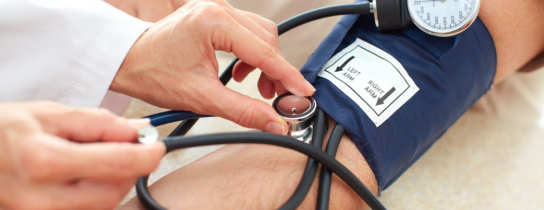
Navigating Hypertension: Prevention, Management, and Care
Nearly 120 million American adults have hypertension, or high blood pressure.1 Although hypertension is common, it can cause other health problems to develop if it goes without treatment.2 If you have been diagnosed with hypertension or want to work to help prevent it, it is important to learn about management, care, and prevention strategies.
Understanding Hypertension: Basics to Know
Hypertension and high blood pressure are used interchangeably.2 Although it’s normal for blood pressure to fluctuate throughout the day, hypertension occurs when your blood pressure is consistently higher than normal.3 Hypertension is diagnosed by monitoring your systolic and diastolic blood pressure over time.3
The systolic measurement is the pressure placed on your arteries each time your heart beats.3 The diastolic measurement is the pressure in your arteries between heartbeats.3 A normal blood pressure is less than 120 (systolic) and less than 80 (diastolic) mmHg.3
People don’t typically have any symptoms of high blood pressure until more serious health problems have developed.4 As a result, one in three adults in the United States isn’t being treated because they don’t know they have it.4
High Blood Pressure Risk Factors
It’s important to know that several factors can increase your risk of hypertension.5 Although some cannot be changed, there are many risk factors over which you do have control.5
Certain medical factors can increase the risk of developing high blood pressure:5
- Having elevated b
- Medical conditions like chronic kidney disease, sleep apnea, obesity, and diabetes are risk factors for hypertension.6 In fact, 60% of people diagnosed with diabetes will also have high blood pressure.5
Some lifestyle choices can also be risk factors for hypertension:5
- The use of tobacco or excessive use of alcohol can raise your blood pressure levels and damage other organs like the liver, kidneys, heart, and lungs.5
- A lack of physical activity and an unhealthy diet, particularly one that is high in sodium, may increase the risk of developing hypertension.6
Your family’s health history, as well as ethnicity, sex, and age, are also risk factors for the development of hypertension:6
- If your parents or other close blood relatives have high blood pressure, you are more likely to develop it.6
- In the United States, Black individuals are more likely to develop high blood pressure compared to people of other racial backgrounds. This condition also tends to be more severe, and certain medications may be less effective in managing high blood pressure in Black individuals.6
- Men aged 64 and younger are more likely to get high blood pressure than women, while women aged 65 and older are more likely to get high blood pressure than men.6
- As a person ages, the likelihood of developing high blood pressure increases. This is partly because blood vessels lose some of their elasticity over time, contributing to higher blood pressure.6
Preventing Hypertension

In many cases it is possible to prevent hypertension by adopting and maintaining a healthy lifestyle. Some lifestyle changes that help include:
- Participating in regular physical activity won’t only improve your fitness levels—it may also help reduce your risks for high blood pressure and heart disease, improve your mental health, lower stress, and decrease the risk of developing serious diseases.7
- A healthy diet limiting saturated fats, added sugars, and foods high in sodium is recommended. Additionally, consuming a variety of foods that are rich in fiber, lean protein and potassium, including fruits and vegetables may help reduce high blood pressure.8
- Maintaining or achieving a healthy weight may help reduce hypertension risk, as well as limiting alcohol* and tobacco intake.8
- Learning how to manage stress through meditation, physical activity, and connecting with your support network will also reduce your hypertension risk, as will getting good quality sleep every night.9
Before beginning any exercise program or making any dietary changes, it’s important to consult with your primary care physician. They can help determine the amounts and types of activities that are best for you.
Treatment and Management of Hypertension
Where diet and lifestyle changes aren’t sufficient to lower your blood pressure, your primary care physician may recommend that you take certain medications, such as ACE inhibitors, diuretics, and angiotensin II receptor blockers (ARBs).9 All of these work in different ways to help lower blood pressure.9
Along with ensuring you take medications as prescribed, it’s important to eat as many heart-healthy foods as you can.9 Your primary care physician may recommend adopting the DASH (Dietary Approaches to Stop Hypertension) diet to help make it easier to find and consume these foods.9
Your primary care physician should also provide you with information on how to take your blood pressure readings and monitor your blood pressure at home.10 It’s important to check your blood pressure regularly and record each reading.10 It will help your primary care physician to know whether your medications or their dosages need to be changed.10
Your pharmacist may be able to recommend apps and other solutions for tracking blood pressure and reminding you to take your medications.10 It’s also important to see your primary care physician regularly to undergo testing or adjustments to your medication.10
Diagnosis and Cutting-Edge Treatment of High Blood Pressure Is Available at Crystal Run Healthcare

Hypertension is a very common condition that can lead to serious disease. Although it is preventable, treatable, and able to be managed, many people don’t know they have hypertension because it rarely is accompanied by any symptoms.
At Crystal Run Healthcare, the initial diagnosis of high blood pressure is typically conducted by your primary care physician using a blood pressure cuff. Routine management of hypertension can also be overseen by your primary care physician.
However, for more complex cases or when specialized care is needed, your primary care physician may refer you to one of our cardiologists. This may include cases such as:
- Secondary hypertension (high blood pressure caused by another medical condition)
- Complications from hypertension, such as heart disease or stroke
- Resistant hypertension (blood pressure that remains high despite using three different medications, including a diuretic)
Thecardiology team at Crystal Run Healthcare includes highly skilled, trained, and board-certified cardiologists. Their experience includes advanced fellowship training in echocardiography, electrophysiology, interventional cardiology, and more.
In addition, we’re the only healthcare facility that offers imaging services, diagnostic services, and cardiac electrophysiology in the region. As a Crystal Run patient, you will benefit from having immediate access to our catheterization lab, which features state-of-the-art equipment.
Sullivan County’s only fully accredited echocardiography and nuclear cardiology labs can be found in Crystal Run facilities located in Rock Hill. We also offer the same treatment in our Middletown, NY location.
If you have hypertension symptoms or risk factors, you should undergo diagnosis and treatment as soon as possible.Schedule an appointment with a primary care physician or call 845-703-6999.
*According to the CDC, drinking in moderation means up to one drink per day for women and up to two drinks per day for men. It is important to note that starting to drink alcohol for health purposes is not recommended.11
Sources:
CDC. High Blood Pressure Facts, Updated 10/30/2023.High Blood Pressure Facts | CDC, Accessed 5/17/2024
- American Heart Association. Health Threats from High Blood Pressure, Updated 5/6/2024.Health Threats from High Blood Pressure | American Heart Association, Accessed 5/17/2024
- CDC. About High Blood Pressure, Updated 10/30/2023.About High Blood Pressure | CDC, Accessed 5/17/2024
- National Heart, Lung, and Blood Institute. What Is High Blood Pressure, Updated 4/15/2024.What Is High Blood Pressure | National Heart, Lung, and Blood Institute, Accessed 5/17/2024
- CDC. High Blood Pressure Risk Factors, Updated 10/10/2023.High Blood Pressure Risk Factors | CDC, Accessed 5/17/2024
- American Heart Association. Know Your Risk Factors for High Blood Pressure, 5/31/2023.Know Your Risk Factors for High Blood Pressure | American Heart Association, Accessed 5/17/2024
- National Heart, Lung, and Blood Institute. Physical Activity and Your Heart: Benefits, Updated 3/24/2022.Physical Activity and Your Heart: Benefits | National Heart, Lung, and Blood Institute, Accessed 5/17/2024
- CDC. Preventing High Blood Pressure, Updated 1/22/2024.Preventing High Blood Pressure CDC, Accessed 5/17/2024
- National Heart, Lung, and Blood Institute. High Blood Pressure: Treatment, Updated 4/30/2024.High Blood Pressure: Treatment | National Heart, Lung, and Blood Institute, Accessed 5/17/2024
- National Heart, Lung, and Blood Institute. High Blood Pressure: Living With High Blood Pressure, Updated 4/30/2024.High Blood Pressure: Living With High Blood Pressure | National Heart, Lung, and Blood Institute, Accessed 5/17/2024
- CDC. About Moderate Alcohol Use, Updated 5/9/2024.About Moderate Alcohol Use | CDC, Accessed, 5/17/2024
The information featured in this site is general in nature. The site provides health information designed to complement your personal health management. It does not provide medical advice or health services and is not meant to replace professional advice or imply coverage of specific clinical services or products. The inclusion of links to other websites does not imply any endorsement of the material on such websites.

 Optum Radiology at Crystal Run Healthcare
Optum Radiology at Crystal Run Healthcare Same and next-day pediatric appointments
Same and next-day pediatric appointments